Critical Discussion: Loss of a Parent and Adolescent Grief Reactions
VerifiedAdded on 2021/02/19
|15
|3577
|112
Essay
AI Summary
This essay provides a critical discussion of adolescent grief following the loss of a parent. It begins by outlining the prevalence and impact of parental loss on adolescents, drawing on statistical data to highlight the significance of the issue. The analysis delves into both normal and complicated grief reactions, referencing models like Kubler-Ross and the dual process model to explain the stages and complexities of grief. It explores the psychological, emotional, and behavioral responses of adolescents. The essay also evaluates the crucial role of helpers, including healthcare workers and caregivers, in supporting adolescents through their grief, emphasizing the importance of social, behavioral, and emotional development. The conclusion summarizes key findings and offers recommendations for supporting grieving adolescents. The essay uses references to support its claims.
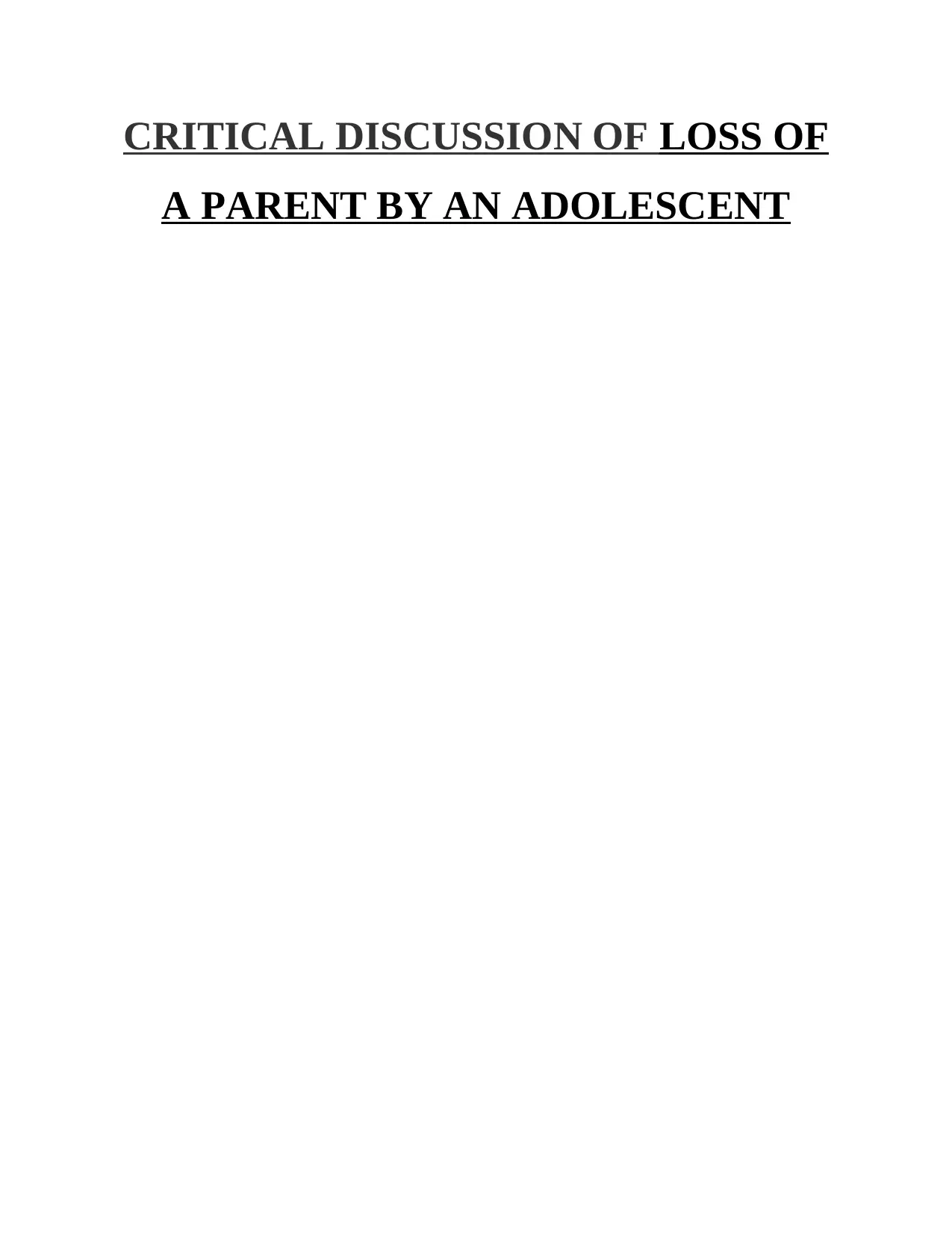
CRITICAL DISCUSSION OF LOSS OF
A PARENT BY AN ADOLESCENT
A PARENT BY AN ADOLESCENT
Paraphrase This Document
Need a fresh take? Get an instant paraphrase of this document with our AI Paraphraser
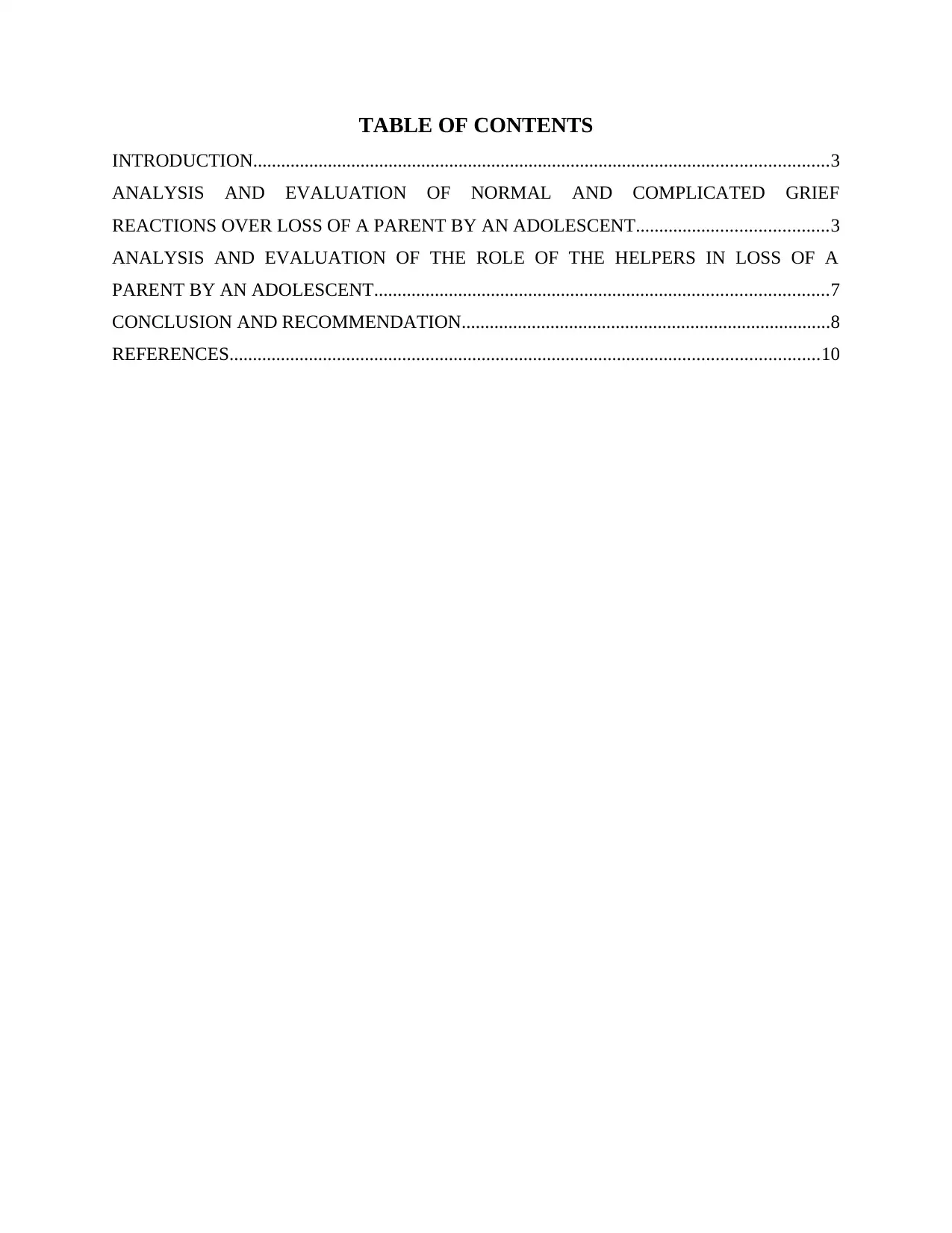
TABLE OF CONTENTS
INTRODUCTION...........................................................................................................................3
ANALYSIS AND EVALUATION OF NORMAL AND COMPLICATED GRIEF
REACTIONS OVER LOSS OF A PARENT BY AN ADOLESCENT.........................................3
ANALYSIS AND EVALUATION OF THE ROLE OF THE HELPERS IN LOSS OF A
PARENT BY AN ADOLESCENT.................................................................................................7
CONCLUSION AND RECOMMENDATION...............................................................................8
REFERENCES..............................................................................................................................10
INTRODUCTION...........................................................................................................................3
ANALYSIS AND EVALUATION OF NORMAL AND COMPLICATED GRIEF
REACTIONS OVER LOSS OF A PARENT BY AN ADOLESCENT.........................................3
ANALYSIS AND EVALUATION OF THE ROLE OF THE HELPERS IN LOSS OF A
PARENT BY AN ADOLESCENT.................................................................................................7
CONCLUSION AND RECOMMENDATION...............................................................................8
REFERENCES..............................................................................................................................10
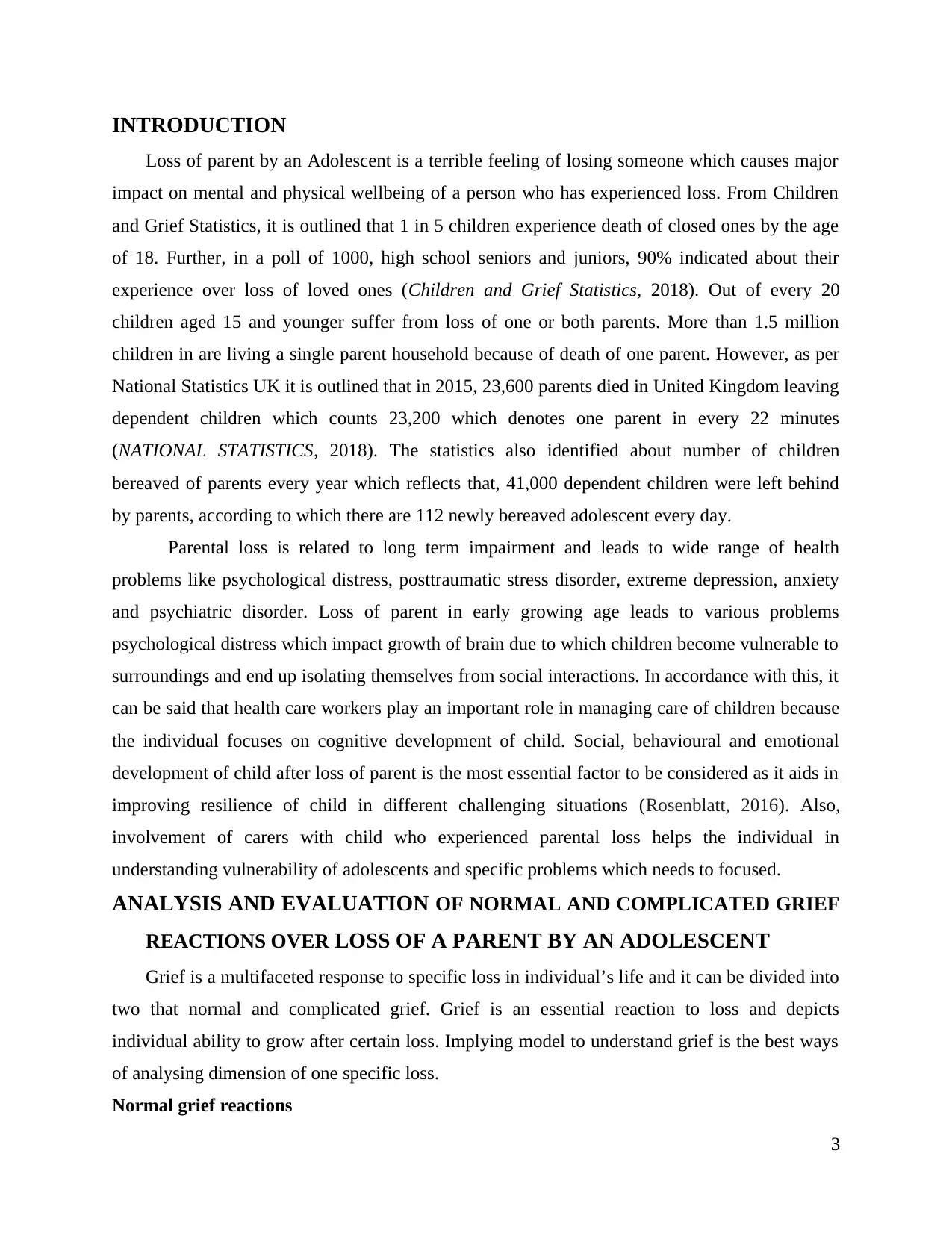
INTRODUCTION
Loss of parent by an Adolescent is a terrible feeling of losing someone which causes major
impact on mental and physical wellbeing of a person who has experienced loss. From Children
and Grief Statistics, it is outlined that 1 in 5 children experience death of closed ones by the age
of 18. Further, in a poll of 1000, high school seniors and juniors, 90% indicated about their
experience over loss of loved ones (Children and Grief Statistics, 2018). Out of every 20
children aged 15 and younger suffer from loss of one or both parents. More than 1.5 million
children in are living a single parent household because of death of one parent. However, as per
National Statistics UK it is outlined that in 2015, 23,600 parents died in United Kingdom leaving
dependent children which counts 23,200 which denotes one parent in every 22 minutes
(NATIONAL STATISTICS, 2018). The statistics also identified about number of children
bereaved of parents every year which reflects that, 41,000 dependent children were left behind
by parents, according to which there are 112 newly bereaved adolescent every day.
Parental loss is related to long term impairment and leads to wide range of health
problems like psychological distress, posttraumatic stress disorder, extreme depression, anxiety
and psychiatric disorder. Loss of parent in early growing age leads to various problems
psychological distress which impact growth of brain due to which children become vulnerable to
surroundings and end up isolating themselves from social interactions. In accordance with this, it
can be said that health care workers play an important role in managing care of children because
the individual focuses on cognitive development of child. Social, behavioural and emotional
development of child after loss of parent is the most essential factor to be considered as it aids in
improving resilience of child in different challenging situations (Rosenblatt, 2016). Also,
involvement of carers with child who experienced parental loss helps the individual in
understanding vulnerability of adolescents and specific problems which needs to focused.
ANALYSIS AND EVALUATION OF NORMAL AND COMPLICATED GRIEF
REACTIONS OVER LOSS OF A PARENT BY AN ADOLESCENT
Grief is a multifaceted response to specific loss in individual’s life and it can be divided into
two that normal and complicated grief. Grief is an essential reaction to loss and depicts
individual ability to grow after certain loss. Implying model to understand grief is the best ways
of analysing dimension of one specific loss.
Normal grief reactions
3
Loss of parent by an Adolescent is a terrible feeling of losing someone which causes major
impact on mental and physical wellbeing of a person who has experienced loss. From Children
and Grief Statistics, it is outlined that 1 in 5 children experience death of closed ones by the age
of 18. Further, in a poll of 1000, high school seniors and juniors, 90% indicated about their
experience over loss of loved ones (Children and Grief Statistics, 2018). Out of every 20
children aged 15 and younger suffer from loss of one or both parents. More than 1.5 million
children in are living a single parent household because of death of one parent. However, as per
National Statistics UK it is outlined that in 2015, 23,600 parents died in United Kingdom leaving
dependent children which counts 23,200 which denotes one parent in every 22 minutes
(NATIONAL STATISTICS, 2018). The statistics also identified about number of children
bereaved of parents every year which reflects that, 41,000 dependent children were left behind
by parents, according to which there are 112 newly bereaved adolescent every day.
Parental loss is related to long term impairment and leads to wide range of health
problems like psychological distress, posttraumatic stress disorder, extreme depression, anxiety
and psychiatric disorder. Loss of parent in early growing age leads to various problems
psychological distress which impact growth of brain due to which children become vulnerable to
surroundings and end up isolating themselves from social interactions. In accordance with this, it
can be said that health care workers play an important role in managing care of children because
the individual focuses on cognitive development of child. Social, behavioural and emotional
development of child after loss of parent is the most essential factor to be considered as it aids in
improving resilience of child in different challenging situations (Rosenblatt, 2016). Also,
involvement of carers with child who experienced parental loss helps the individual in
understanding vulnerability of adolescents and specific problems which needs to focused.
ANALYSIS AND EVALUATION OF NORMAL AND COMPLICATED GRIEF
REACTIONS OVER LOSS OF A PARENT BY AN ADOLESCENT
Grief is a multifaceted response to specific loss in individual’s life and it can be divided into
two that normal and complicated grief. Grief is an essential reaction to loss and depicts
individual ability to grow after certain loss. Implying model to understand grief is the best ways
of analysing dimension of one specific loss.
Normal grief reactions
3
⊘ This is a preview!⊘
Do you want full access?
Subscribe today to unlock all pages.

Trusted by 1+ million students worldwide
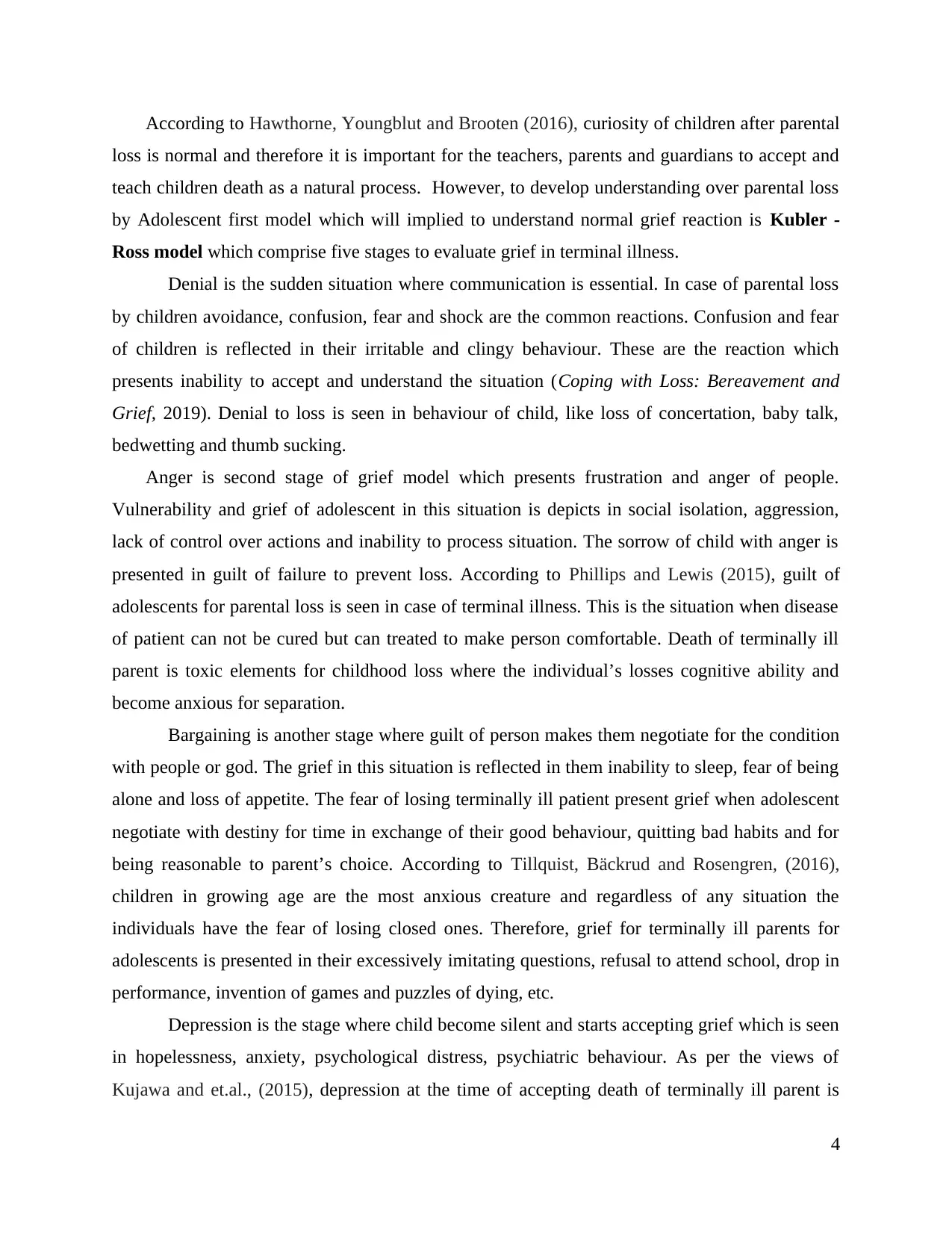
According to Hawthorne, Youngblut and Brooten (2016), curiosity of children after parental
loss is normal and therefore it is important for the teachers, parents and guardians to accept and
teach children death as a natural process. However, to develop understanding over parental loss
by Adolescent first model which will implied to understand normal grief reaction is Kubler -
Ross model which comprise five stages to evaluate grief in terminal illness.
Denial is the sudden situation where communication is essential. In case of parental loss
by children avoidance, confusion, fear and shock are the common reactions. Confusion and fear
of children is reflected in their irritable and clingy behaviour. These are the reaction which
presents inability to accept and understand the situation (Coping with Loss: Bereavement and
Grief, 2019). Denial to loss is seen in behaviour of child, like loss of concertation, baby talk,
bedwetting and thumb sucking.
Anger is second stage of grief model which presents frustration and anger of people.
Vulnerability and grief of adolescent in this situation is depicts in social isolation, aggression,
lack of control over actions and inability to process situation. The sorrow of child with anger is
presented in guilt of failure to prevent loss. According to Phillips and Lewis (2015), guilt of
adolescents for parental loss is seen in case of terminal illness. This is the situation when disease
of patient can not be cured but can treated to make person comfortable. Death of terminally ill
parent is toxic elements for childhood loss where the individual’s losses cognitive ability and
become anxious for separation.
Bargaining is another stage where guilt of person makes them negotiate for the condition
with people or god. The grief in this situation is reflected in them inability to sleep, fear of being
alone and loss of appetite. The fear of losing terminally ill patient present grief when adolescent
negotiate with destiny for time in exchange of their good behaviour, quitting bad habits and for
being reasonable to parent’s choice. According to Tillquist, Bäckrud and Rosengren, (2016),
children in growing age are the most anxious creature and regardless of any situation the
individuals have the fear of losing closed ones. Therefore, grief for terminally ill parents for
adolescents is presented in their excessively imitating questions, refusal to attend school, drop in
performance, invention of games and puzzles of dying, etc.
Depression is the stage where child become silent and starts accepting grief which is seen
in hopelessness, anxiety, psychological distress, psychiatric behaviour. As per the views of
Kujawa and et.al., (2015), depression at the time of accepting death of terminally ill parent is
4
loss is normal and therefore it is important for the teachers, parents and guardians to accept and
teach children death as a natural process. However, to develop understanding over parental loss
by Adolescent first model which will implied to understand normal grief reaction is Kubler -
Ross model which comprise five stages to evaluate grief in terminal illness.
Denial is the sudden situation where communication is essential. In case of parental loss
by children avoidance, confusion, fear and shock are the common reactions. Confusion and fear
of children is reflected in their irritable and clingy behaviour. These are the reaction which
presents inability to accept and understand the situation (Coping with Loss: Bereavement and
Grief, 2019). Denial to loss is seen in behaviour of child, like loss of concertation, baby talk,
bedwetting and thumb sucking.
Anger is second stage of grief model which presents frustration and anger of people.
Vulnerability and grief of adolescent in this situation is depicts in social isolation, aggression,
lack of control over actions and inability to process situation. The sorrow of child with anger is
presented in guilt of failure to prevent loss. According to Phillips and Lewis (2015), guilt of
adolescents for parental loss is seen in case of terminal illness. This is the situation when disease
of patient can not be cured but can treated to make person comfortable. Death of terminally ill
parent is toxic elements for childhood loss where the individual’s losses cognitive ability and
become anxious for separation.
Bargaining is another stage where guilt of person makes them negotiate for the condition
with people or god. The grief in this situation is reflected in them inability to sleep, fear of being
alone and loss of appetite. The fear of losing terminally ill patient present grief when adolescent
negotiate with destiny for time in exchange of their good behaviour, quitting bad habits and for
being reasonable to parent’s choice. According to Tillquist, Bäckrud and Rosengren, (2016),
children in growing age are the most anxious creature and regardless of any situation the
individuals have the fear of losing closed ones. Therefore, grief for terminally ill parents for
adolescents is presented in their excessively imitating questions, refusal to attend school, drop in
performance, invention of games and puzzles of dying, etc.
Depression is the stage where child become silent and starts accepting grief which is seen
in hopelessness, anxiety, psychological distress, psychiatric behaviour. As per the views of
Kujawa and et.al., (2015), depression at the time of accepting death of terminally ill parent is
4
Paraphrase This Document
Need a fresh take? Get an instant paraphrase of this document with our AI Paraphraser
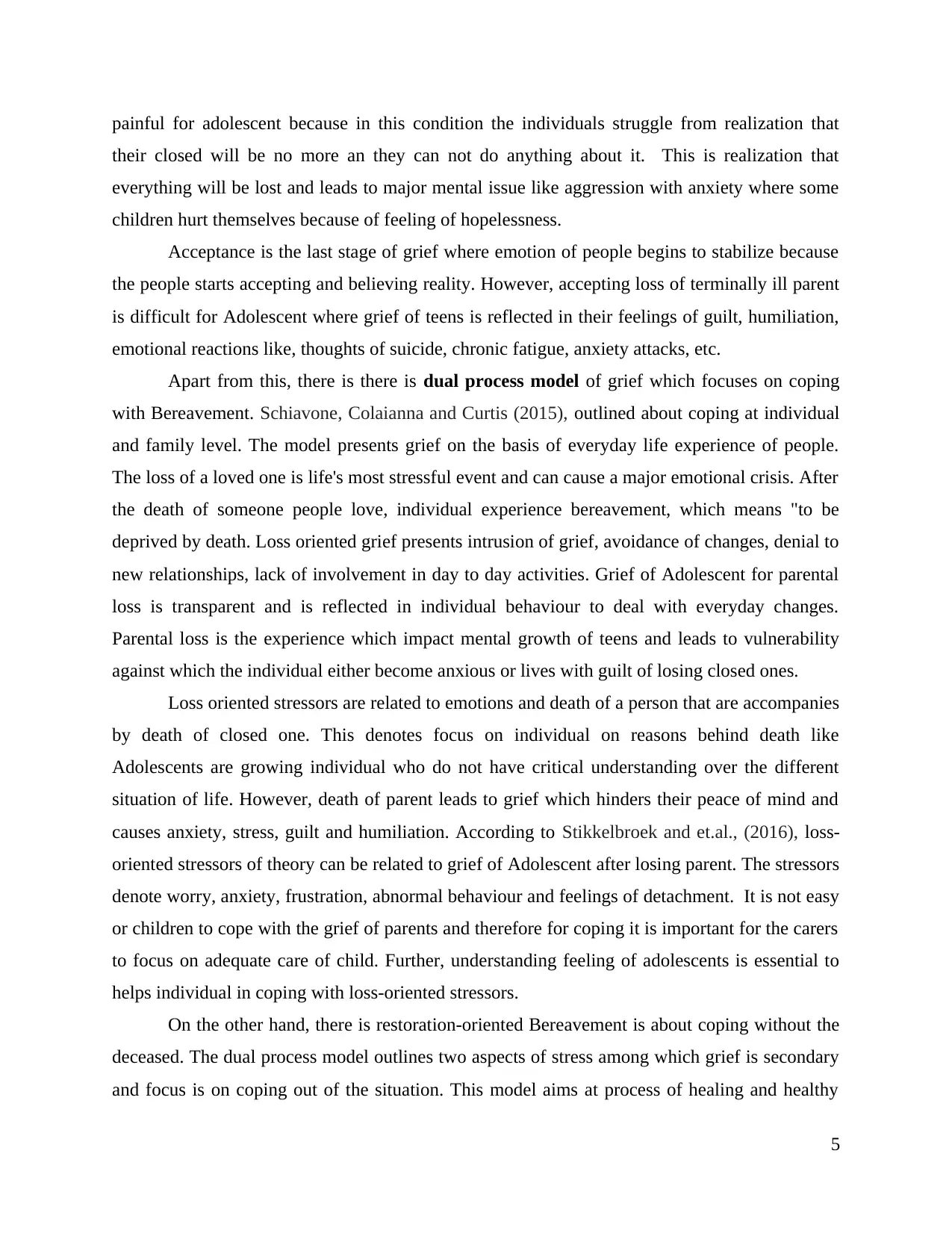
painful for adolescent because in this condition the individuals struggle from realization that
their closed will be no more an they can not do anything about it. This is realization that
everything will be lost and leads to major mental issue like aggression with anxiety where some
children hurt themselves because of feeling of hopelessness.
Acceptance is the last stage of grief where emotion of people begins to stabilize because
the people starts accepting and believing reality. However, accepting loss of terminally ill parent
is difficult for Adolescent where grief of teens is reflected in their feelings of guilt, humiliation,
emotional reactions like, thoughts of suicide, chronic fatigue, anxiety attacks, etc.
Apart from this, there is there is dual process model of grief which focuses on coping
with Bereavement. Schiavone, Colaianna and Curtis (2015), outlined about coping at individual
and family level. The model presents grief on the basis of everyday life experience of people.
The loss of a loved one is life's most stressful event and can cause a major emotional crisis. After
the death of someone people love, individual experience bereavement, which means "to be
deprived by death. Loss oriented grief presents intrusion of grief, avoidance of changes, denial to
new relationships, lack of involvement in day to day activities. Grief of Adolescent for parental
loss is transparent and is reflected in individual behaviour to deal with everyday changes.
Parental loss is the experience which impact mental growth of teens and leads to vulnerability
against which the individual either become anxious or lives with guilt of losing closed ones.
Loss oriented stressors are related to emotions and death of a person that are accompanies
by death of closed one. This denotes focus on individual on reasons behind death like
Adolescents are growing individual who do not have critical understanding over the different
situation of life. However, death of parent leads to grief which hinders their peace of mind and
causes anxiety, stress, guilt and humiliation. According to Stikkelbroek and et.al., (2016), loss-
oriented stressors of theory can be related to grief of Adolescent after losing parent. The stressors
denote worry, anxiety, frustration, abnormal behaviour and feelings of detachment. It is not easy
or children to cope with the grief of parents and therefore for coping it is important for the carers
to focus on adequate care of child. Further, understanding feeling of adolescents is essential to
helps individual in coping with loss-oriented stressors.
On the other hand, there is restoration-oriented Bereavement is about coping without the
deceased. The dual process model outlines two aspects of stress among which grief is secondary
and focus is on coping out of the situation. This model aims at process of healing and healthy
5
their closed will be no more an they can not do anything about it. This is realization that
everything will be lost and leads to major mental issue like aggression with anxiety where some
children hurt themselves because of feeling of hopelessness.
Acceptance is the last stage of grief where emotion of people begins to stabilize because
the people starts accepting and believing reality. However, accepting loss of terminally ill parent
is difficult for Adolescent where grief of teens is reflected in their feelings of guilt, humiliation,
emotional reactions like, thoughts of suicide, chronic fatigue, anxiety attacks, etc.
Apart from this, there is there is dual process model of grief which focuses on coping
with Bereavement. Schiavone, Colaianna and Curtis (2015), outlined about coping at individual
and family level. The model presents grief on the basis of everyday life experience of people.
The loss of a loved one is life's most stressful event and can cause a major emotional crisis. After
the death of someone people love, individual experience bereavement, which means "to be
deprived by death. Loss oriented grief presents intrusion of grief, avoidance of changes, denial to
new relationships, lack of involvement in day to day activities. Grief of Adolescent for parental
loss is transparent and is reflected in individual behaviour to deal with everyday changes.
Parental loss is the experience which impact mental growth of teens and leads to vulnerability
against which the individual either become anxious or lives with guilt of losing closed ones.
Loss oriented stressors are related to emotions and death of a person that are accompanies
by death of closed one. This denotes focus on individual on reasons behind death like
Adolescents are growing individual who do not have critical understanding over the different
situation of life. However, death of parent leads to grief which hinders their peace of mind and
causes anxiety, stress, guilt and humiliation. According to Stikkelbroek and et.al., (2016), loss-
oriented stressors of theory can be related to grief of Adolescent after losing parent. The stressors
denote worry, anxiety, frustration, abnormal behaviour and feelings of detachment. It is not easy
or children to cope with the grief of parents and therefore for coping it is important for the carers
to focus on adequate care of child. Further, understanding feeling of adolescents is essential to
helps individual in coping with loss-oriented stressors.
On the other hand, there is restoration-oriented Bereavement is about coping without the
deceased. The dual process model outlines two aspects of stress among which grief is secondary
and focus is on coping out of the situation. This model aims at process of healing and healthy
5
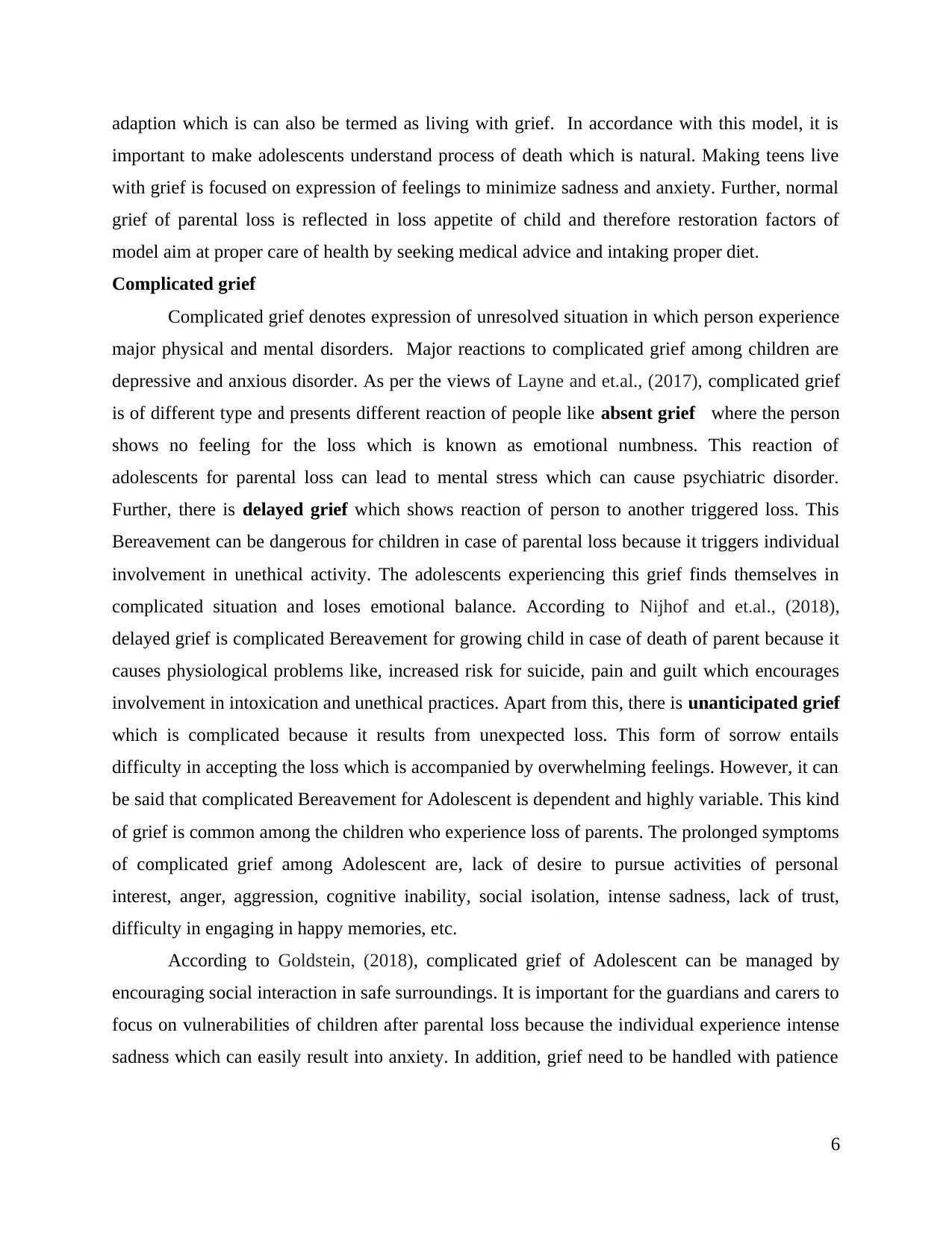
adaption which is can also be termed as living with grief. In accordance with this model, it is
important to make adolescents understand process of death which is natural. Making teens live
with grief is focused on expression of feelings to minimize sadness and anxiety. Further, normal
grief of parental loss is reflected in loss appetite of child and therefore restoration factors of
model aim at proper care of health by seeking medical advice and intaking proper diet.
Complicated grief
Complicated grief denotes expression of unresolved situation in which person experience
major physical and mental disorders. Major reactions to complicated grief among children are
depressive and anxious disorder. As per the views of Layne and et.al., (2017), complicated grief
is of different type and presents different reaction of people like absent grief where the person
shows no feeling for the loss which is known as emotional numbness. This reaction of
adolescents for parental loss can lead to mental stress which can cause psychiatric disorder.
Further, there is delayed grief which shows reaction of person to another triggered loss. This
Bereavement can be dangerous for children in case of parental loss because it triggers individual
involvement in unethical activity. The adolescents experiencing this grief finds themselves in
complicated situation and loses emotional balance. According to Nijhof and et.al., (2018),
delayed grief is complicated Bereavement for growing child in case of death of parent because it
causes physiological problems like, increased risk for suicide, pain and guilt which encourages
involvement in intoxication and unethical practices. Apart from this, there is unanticipated grief
which is complicated because it results from unexpected loss. This form of sorrow entails
difficulty in accepting the loss which is accompanied by overwhelming feelings. However, it can
be said that complicated Bereavement for Adolescent is dependent and highly variable. This kind
of grief is common among the children who experience loss of parents. The prolonged symptoms
of complicated grief among Adolescent are, lack of desire to pursue activities of personal
interest, anger, aggression, cognitive inability, social isolation, intense sadness, lack of trust,
difficulty in engaging in happy memories, etc.
According to Goldstein, (2018), complicated grief of Adolescent can be managed by
encouraging social interaction in safe surroundings. It is important for the guardians and carers to
focus on vulnerabilities of children after parental loss because the individual experience intense
sadness which can easily result into anxiety. In addition, grief need to be handled with patience
6
important to make adolescents understand process of death which is natural. Making teens live
with grief is focused on expression of feelings to minimize sadness and anxiety. Further, normal
grief of parental loss is reflected in loss appetite of child and therefore restoration factors of
model aim at proper care of health by seeking medical advice and intaking proper diet.
Complicated grief
Complicated grief denotes expression of unresolved situation in which person experience
major physical and mental disorders. Major reactions to complicated grief among children are
depressive and anxious disorder. As per the views of Layne and et.al., (2017), complicated grief
is of different type and presents different reaction of people like absent grief where the person
shows no feeling for the loss which is known as emotional numbness. This reaction of
adolescents for parental loss can lead to mental stress which can cause psychiatric disorder.
Further, there is delayed grief which shows reaction of person to another triggered loss. This
Bereavement can be dangerous for children in case of parental loss because it triggers individual
involvement in unethical activity. The adolescents experiencing this grief finds themselves in
complicated situation and loses emotional balance. According to Nijhof and et.al., (2018),
delayed grief is complicated Bereavement for growing child in case of death of parent because it
causes physiological problems like, increased risk for suicide, pain and guilt which encourages
involvement in intoxication and unethical practices. Apart from this, there is unanticipated grief
which is complicated because it results from unexpected loss. This form of sorrow entails
difficulty in accepting the loss which is accompanied by overwhelming feelings. However, it can
be said that complicated Bereavement for Adolescent is dependent and highly variable. This kind
of grief is common among the children who experience loss of parents. The prolonged symptoms
of complicated grief among Adolescent are, lack of desire to pursue activities of personal
interest, anger, aggression, cognitive inability, social isolation, intense sadness, lack of trust,
difficulty in engaging in happy memories, etc.
According to Goldstein, (2018), complicated grief of Adolescent can be managed by
encouraging social interaction in safe surroundings. It is important for the guardians and carers to
focus on vulnerabilities of children after parental loss because the individual experience intense
sadness which can easily result into anxiety. In addition, grief need to be handled with patience
6
⊘ This is a preview!⊘
Do you want full access?
Subscribe today to unlock all pages.

Trusted by 1+ million students worldwide
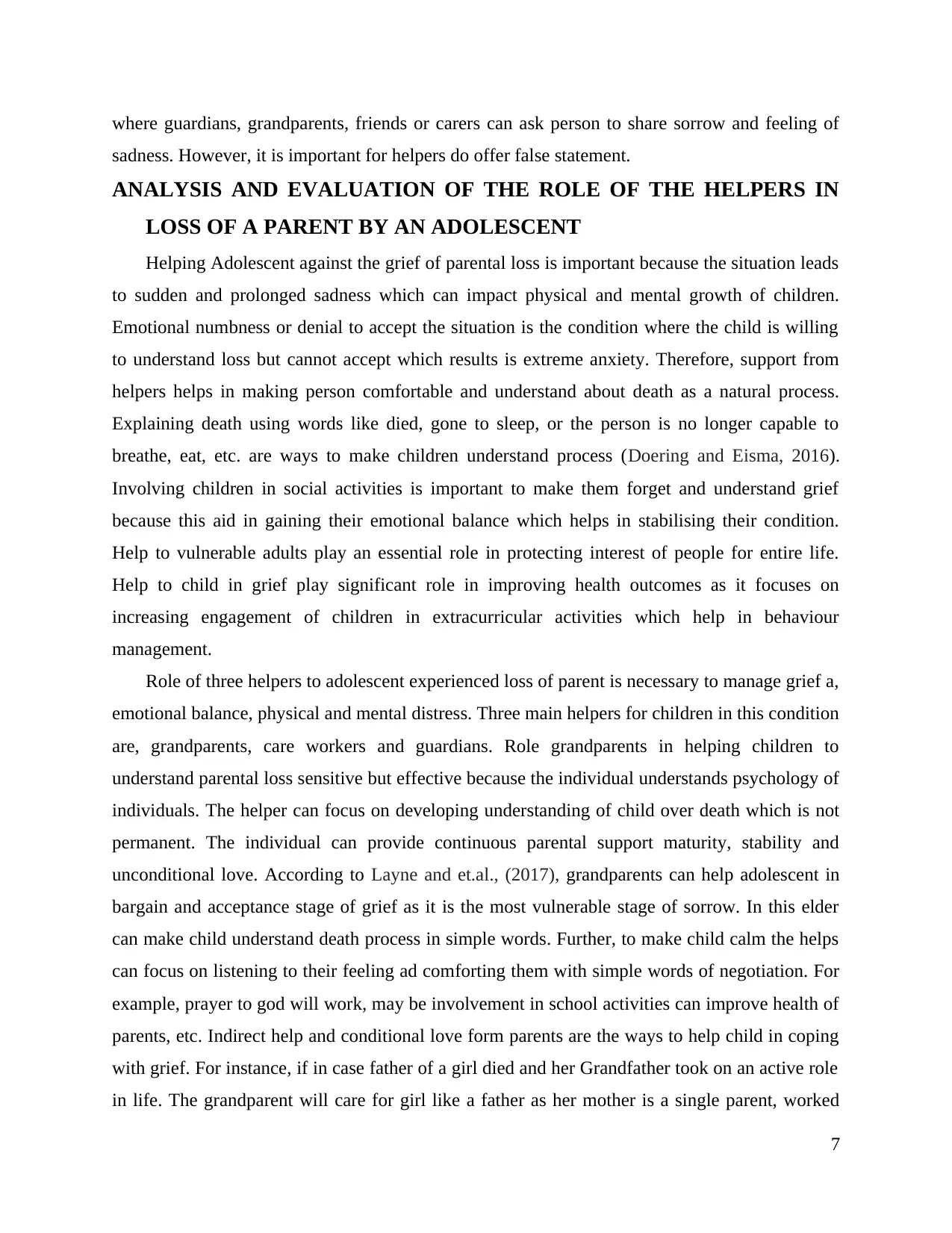
where guardians, grandparents, friends or carers can ask person to share sorrow and feeling of
sadness. However, it is important for helpers do offer false statement.
ANALYSIS AND EVALUATION OF THE ROLE OF THE HELPERS IN
LOSS OF A PARENT BY AN ADOLESCENT
Helping Adolescent against the grief of parental loss is important because the situation leads
to sudden and prolonged sadness which can impact physical and mental growth of children.
Emotional numbness or denial to accept the situation is the condition where the child is willing
to understand loss but cannot accept which results is extreme anxiety. Therefore, support from
helpers helps in making person comfortable and understand about death as a natural process.
Explaining death using words like died, gone to sleep, or the person is no longer capable to
breathe, eat, etc. are ways to make children understand process (Doering and Eisma, 2016).
Involving children in social activities is important to make them forget and understand grief
because this aid in gaining their emotional balance which helps in stabilising their condition.
Help to vulnerable adults play an essential role in protecting interest of people for entire life.
Help to child in grief play significant role in improving health outcomes as it focuses on
increasing engagement of children in extracurricular activities which help in behaviour
management.
Role of three helpers to adolescent experienced loss of parent is necessary to manage grief a,
emotional balance, physical and mental distress. Three main helpers for children in this condition
are, grandparents, care workers and guardians. Role grandparents in helping children to
understand parental loss sensitive but effective because the individual understands psychology of
individuals. The helper can focus on developing understanding of child over death which is not
permanent. The individual can provide continuous parental support maturity, stability and
unconditional love. According to Layne and et.al., (2017), grandparents can help adolescent in
bargain and acceptance stage of grief as it is the most vulnerable stage of sorrow. In this elder
can make child understand death process in simple words. Further, to make child calm the helps
can focus on listening to their feeling ad comforting them with simple words of negotiation. For
example, prayer to god will work, may be involvement in school activities can improve health of
parents, etc. Indirect help and conditional love form parents are the ways to help child in coping
with grief. For instance, if in case father of a girl died and her Grandfather took on an active role
in life. The grandparent will care for girl like a father as her mother is a single parent, worked
7
sadness. However, it is important for helpers do offer false statement.
ANALYSIS AND EVALUATION OF THE ROLE OF THE HELPERS IN
LOSS OF A PARENT BY AN ADOLESCENT
Helping Adolescent against the grief of parental loss is important because the situation leads
to sudden and prolonged sadness which can impact physical and mental growth of children.
Emotional numbness or denial to accept the situation is the condition where the child is willing
to understand loss but cannot accept which results is extreme anxiety. Therefore, support from
helpers helps in making person comfortable and understand about death as a natural process.
Explaining death using words like died, gone to sleep, or the person is no longer capable to
breathe, eat, etc. are ways to make children understand process (Doering and Eisma, 2016).
Involving children in social activities is important to make them forget and understand grief
because this aid in gaining their emotional balance which helps in stabilising their condition.
Help to vulnerable adults play an essential role in protecting interest of people for entire life.
Help to child in grief play significant role in improving health outcomes as it focuses on
increasing engagement of children in extracurricular activities which help in behaviour
management.
Role of three helpers to adolescent experienced loss of parent is necessary to manage grief a,
emotional balance, physical and mental distress. Three main helpers for children in this condition
are, grandparents, care workers and guardians. Role grandparents in helping children to
understand parental loss sensitive but effective because the individual understands psychology of
individuals. The helper can focus on developing understanding of child over death which is not
permanent. The individual can provide continuous parental support maturity, stability and
unconditional love. According to Layne and et.al., (2017), grandparents can help adolescent in
bargain and acceptance stage of grief as it is the most vulnerable stage of sorrow. In this elder
can make child understand death process in simple words. Further, to make child calm the helps
can focus on listening to their feeling ad comforting them with simple words of negotiation. For
example, prayer to god will work, may be involvement in school activities can improve health of
parents, etc. Indirect help and conditional love form parents are the ways to help child in coping
with grief. For instance, if in case father of a girl died and her Grandfather took on an active role
in life. The grandparent will care for girl like a father as her mother is a single parent, worked
7
Paraphrase This Document
Need a fresh take? Get an instant paraphrase of this document with our AI Paraphraser
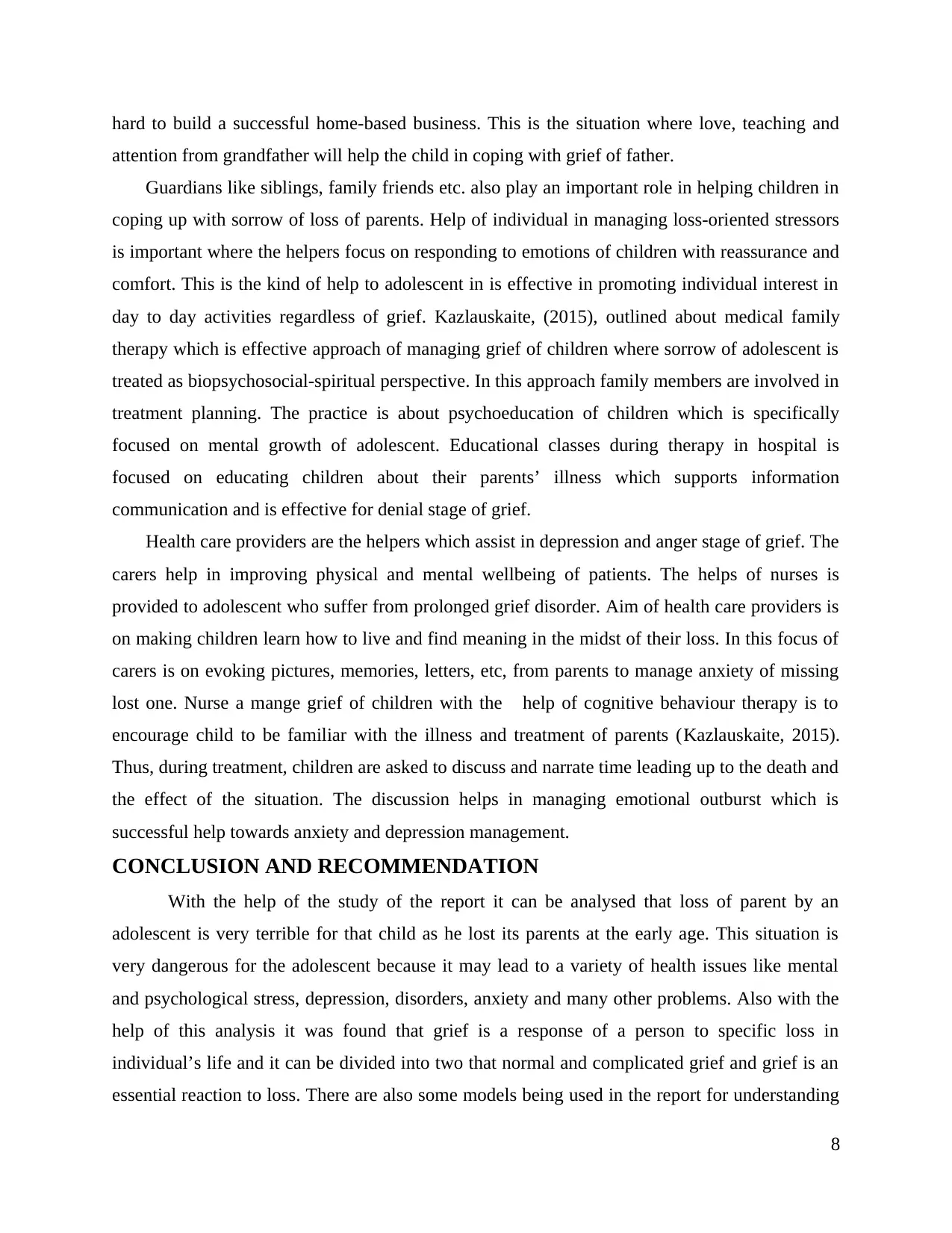
hard to build a successful home-based business. This is the situation where love, teaching and
attention from grandfather will help the child in coping with grief of father.
Guardians like siblings, family friends etc. also play an important role in helping children in
coping up with sorrow of loss of parents. Help of individual in managing loss-oriented stressors
is important where the helpers focus on responding to emotions of children with reassurance and
comfort. This is the kind of help to adolescent in is effective in promoting individual interest in
day to day activities regardless of grief. Kazlauskaite, (2015), outlined about medical family
therapy which is effective approach of managing grief of children where sorrow of adolescent is
treated as biopsychosocial-spiritual perspective. In this approach family members are involved in
treatment planning. The practice is about psychoeducation of children which is specifically
focused on mental growth of adolescent. Educational classes during therapy in hospital is
focused on educating children about their parents’ illness which supports information
communication and is effective for denial stage of grief.
Health care providers are the helpers which assist in depression and anger stage of grief. The
carers help in improving physical and mental wellbeing of patients. The helps of nurses is
provided to adolescent who suffer from prolonged grief disorder. Aim of health care providers is
on making children learn how to live and find meaning in the midst of their loss. In this focus of
carers is on evoking pictures, memories, letters, etc, from parents to manage anxiety of missing
lost one. Nurse a mange grief of children with the help of cognitive behaviour therapy is to
encourage child to be familiar with the illness and treatment of parents (Kazlauskaite, 2015).
Thus, during treatment, children are asked to discuss and narrate time leading up to the death and
the effect of the situation. The discussion helps in managing emotional outburst which is
successful help towards anxiety and depression management.
CONCLUSION AND RECOMMENDATION
With the help of the study of the report it can be analysed that loss of parent by an
adolescent is very terrible for that child as he lost its parents at the early age. This situation is
very dangerous for the adolescent because it may lead to a variety of health issues like mental
and psychological stress, depression, disorders, anxiety and many other problems. Also with the
help of this analysis it was found that grief is a response of a person to specific loss in
individual’s life and it can be divided into two that normal and complicated grief and grief is an
essential reaction to loss. There are also some models being used in the report for understanding
8
attention from grandfather will help the child in coping with grief of father.
Guardians like siblings, family friends etc. also play an important role in helping children in
coping up with sorrow of loss of parents. Help of individual in managing loss-oriented stressors
is important where the helpers focus on responding to emotions of children with reassurance and
comfort. This is the kind of help to adolescent in is effective in promoting individual interest in
day to day activities regardless of grief. Kazlauskaite, (2015), outlined about medical family
therapy which is effective approach of managing grief of children where sorrow of adolescent is
treated as biopsychosocial-spiritual perspective. In this approach family members are involved in
treatment planning. The practice is about psychoeducation of children which is specifically
focused on mental growth of adolescent. Educational classes during therapy in hospital is
focused on educating children about their parents’ illness which supports information
communication and is effective for denial stage of grief.
Health care providers are the helpers which assist in depression and anger stage of grief. The
carers help in improving physical and mental wellbeing of patients. The helps of nurses is
provided to adolescent who suffer from prolonged grief disorder. Aim of health care providers is
on making children learn how to live and find meaning in the midst of their loss. In this focus of
carers is on evoking pictures, memories, letters, etc, from parents to manage anxiety of missing
lost one. Nurse a mange grief of children with the help of cognitive behaviour therapy is to
encourage child to be familiar with the illness and treatment of parents (Kazlauskaite, 2015).
Thus, during treatment, children are asked to discuss and narrate time leading up to the death and
the effect of the situation. The discussion helps in managing emotional outburst which is
successful help towards anxiety and depression management.
CONCLUSION AND RECOMMENDATION
With the help of the study of the report it can be analysed that loss of parent by an
adolescent is very terrible for that child as he lost its parents at the early age. This situation is
very dangerous for the adolescent because it may lead to a variety of health issues like mental
and psychological stress, depression, disorders, anxiety and many other problems. Also with the
help of this analysis it was found that grief is a response of a person to specific loss in
individual’s life and it can be divided into two that normal and complicated grief and grief is an
essential reaction to loss. There are also some models being used in the report for understanding
8
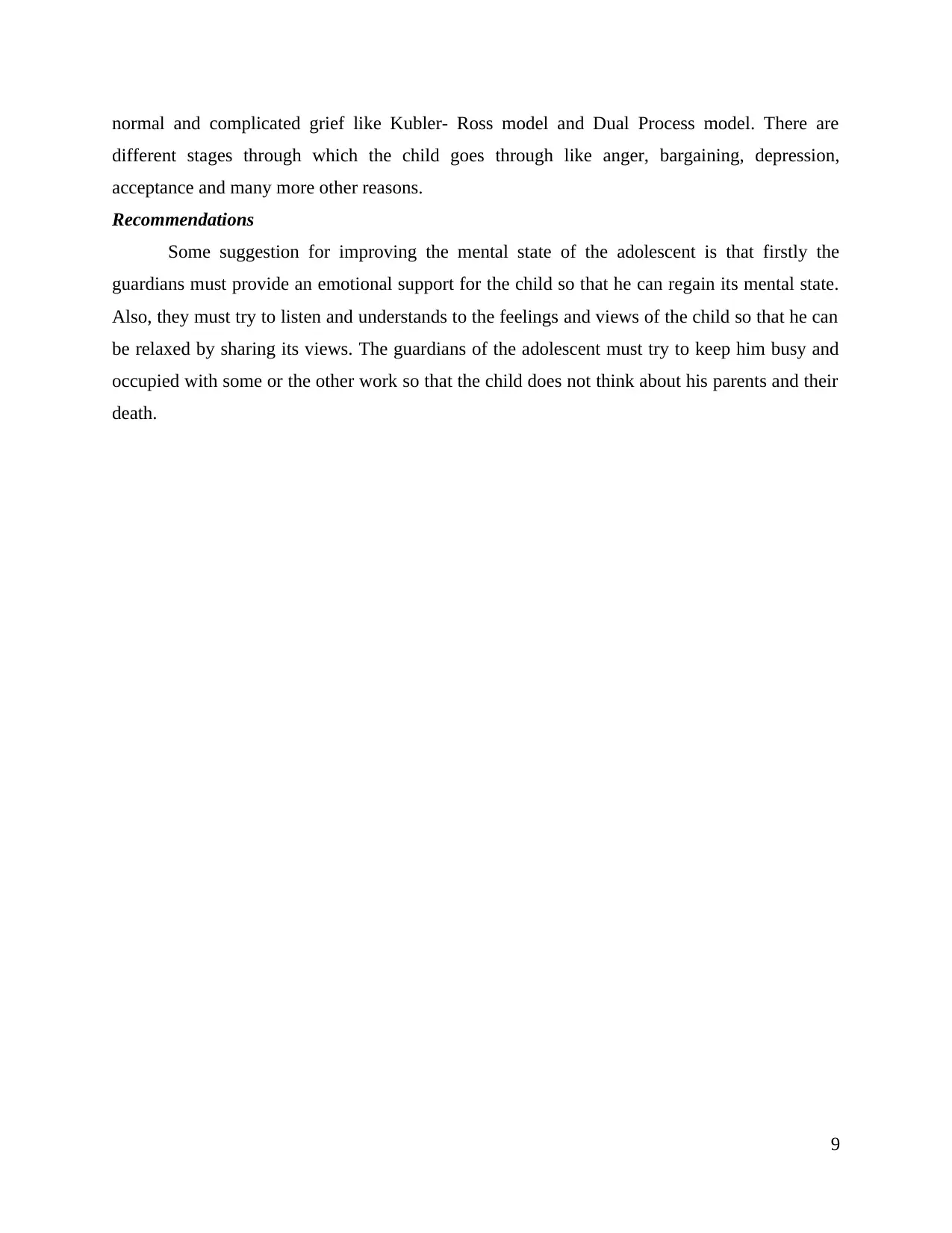
normal and complicated grief like Kubler- Ross model and Dual Process model. There are
different stages through which the child goes through like anger, bargaining, depression,
acceptance and many more other reasons.
Recommendations
Some suggestion for improving the mental state of the adolescent is that firstly the
guardians must provide an emotional support for the child so that he can regain its mental state.
Also, they must try to listen and understands to the feelings and views of the child so that he can
be relaxed by sharing its views. The guardians of the adolescent must try to keep him busy and
occupied with some or the other work so that the child does not think about his parents and their
death.
9
different stages through which the child goes through like anger, bargaining, depression,
acceptance and many more other reasons.
Recommendations
Some suggestion for improving the mental state of the adolescent is that firstly the
guardians must provide an emotional support for the child so that he can regain its mental state.
Also, they must try to listen and understands to the feelings and views of the child so that he can
be relaxed by sharing its views. The guardians of the adolescent must try to keep him busy and
occupied with some or the other work so that the child does not think about his parents and their
death.
9
⊘ This is a preview!⊘
Do you want full access?
Subscribe today to unlock all pages.

Trusted by 1+ million students worldwide
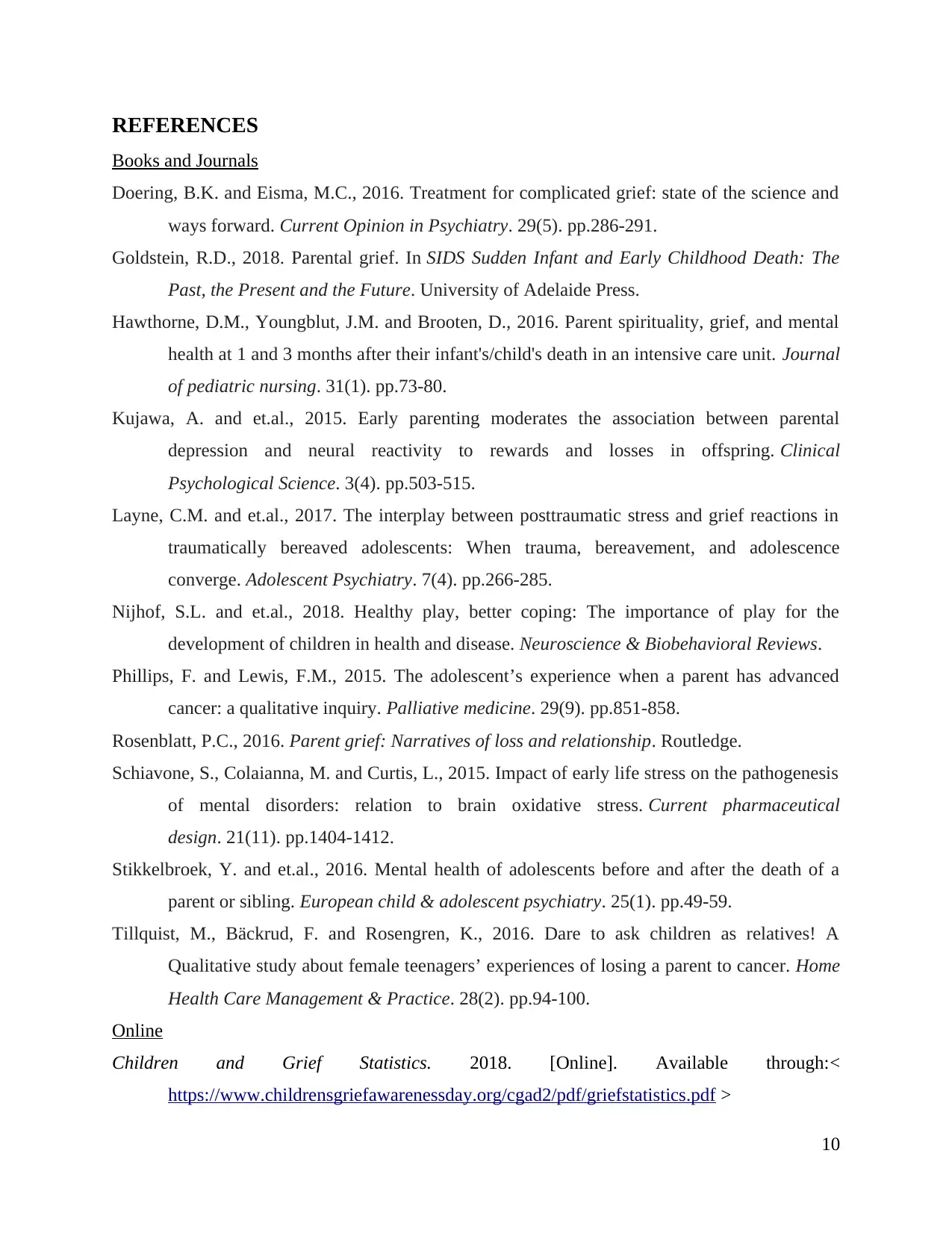
REFERENCES
Books and Journals
Doering, B.K. and Eisma, M.C., 2016. Treatment for complicated grief: state of the science and
ways forward. Current Opinion in Psychiatry. 29(5). pp.286-291.
Goldstein, R.D., 2018. Parental grief. In SIDS Sudden Infant and Early Childhood Death: The
Past, the Present and the Future. University of Adelaide Press.
Hawthorne, D.M., Youngblut, J.M. and Brooten, D., 2016. Parent spirituality, grief, and mental
health at 1 and 3 months after their infant's/child's death in an intensive care unit. Journal
of pediatric nursing. 31(1). pp.73-80.
Kujawa, A. and et.al., 2015. Early parenting moderates the association between parental
depression and neural reactivity to rewards and losses in offspring. Clinical
Psychological Science. 3(4). pp.503-515.
Layne, C.M. and et.al., 2017. The interplay between posttraumatic stress and grief reactions in
traumatically bereaved adolescents: When trauma, bereavement, and adolescence
converge. Adolescent Psychiatry. 7(4). pp.266-285.
Nijhof, S.L. and et.al., 2018. Healthy play, better coping: The importance of play for the
development of children in health and disease. Neuroscience & Biobehavioral Reviews.
Phillips, F. and Lewis, F.M., 2015. The adolescent’s experience when a parent has advanced
cancer: a qualitative inquiry. Palliative medicine. 29(9). pp.851-858.
Rosenblatt, P.C., 2016. Parent grief: Narratives of loss and relationship. Routledge.
Schiavone, S., Colaianna, M. and Curtis, L., 2015. Impact of early life stress on the pathogenesis
of mental disorders: relation to brain oxidative stress. Current pharmaceutical
design. 21(11). pp.1404-1412.
Stikkelbroek, Y. and et.al., 2016. Mental health of adolescents before and after the death of a
parent or sibling. European child & adolescent psychiatry. 25(1). pp.49-59.
Tillquist, M., Bäckrud, F. and Rosengren, K., 2016. Dare to ask children as relatives! A
Qualitative study about female teenagers’ experiences of losing a parent to cancer. Home
Health Care Management & Practice. 28(2). pp.94-100.
Online
Children and Grief Statistics. 2018. [Online]. Available through:<
https://www.childrensgriefawarenessday.org/cgad2/pdf/griefstatistics.pdf >
10
Books and Journals
Doering, B.K. and Eisma, M.C., 2016. Treatment for complicated grief: state of the science and
ways forward. Current Opinion in Psychiatry. 29(5). pp.286-291.
Goldstein, R.D., 2018. Parental grief. In SIDS Sudden Infant and Early Childhood Death: The
Past, the Present and the Future. University of Adelaide Press.
Hawthorne, D.M., Youngblut, J.M. and Brooten, D., 2016. Parent spirituality, grief, and mental
health at 1 and 3 months after their infant's/child's death in an intensive care unit. Journal
of pediatric nursing. 31(1). pp.73-80.
Kujawa, A. and et.al., 2015. Early parenting moderates the association between parental
depression and neural reactivity to rewards and losses in offspring. Clinical
Psychological Science. 3(4). pp.503-515.
Layne, C.M. and et.al., 2017. The interplay between posttraumatic stress and grief reactions in
traumatically bereaved adolescents: When trauma, bereavement, and adolescence
converge. Adolescent Psychiatry. 7(4). pp.266-285.
Nijhof, S.L. and et.al., 2018. Healthy play, better coping: The importance of play for the
development of children in health and disease. Neuroscience & Biobehavioral Reviews.
Phillips, F. and Lewis, F.M., 2015. The adolescent’s experience when a parent has advanced
cancer: a qualitative inquiry. Palliative medicine. 29(9). pp.851-858.
Rosenblatt, P.C., 2016. Parent grief: Narratives of loss and relationship. Routledge.
Schiavone, S., Colaianna, M. and Curtis, L., 2015. Impact of early life stress on the pathogenesis
of mental disorders: relation to brain oxidative stress. Current pharmaceutical
design. 21(11). pp.1404-1412.
Stikkelbroek, Y. and et.al., 2016. Mental health of adolescents before and after the death of a
parent or sibling. European child & adolescent psychiatry. 25(1). pp.49-59.
Tillquist, M., Bäckrud, F. and Rosengren, K., 2016. Dare to ask children as relatives! A
Qualitative study about female teenagers’ experiences of losing a parent to cancer. Home
Health Care Management & Practice. 28(2). pp.94-100.
Online
Children and Grief Statistics. 2018. [Online]. Available through:<
https://www.childrensgriefawarenessday.org/cgad2/pdf/griefstatistics.pdf >
10
Paraphrase This Document
Need a fresh take? Get an instant paraphrase of this document with our AI Paraphraser
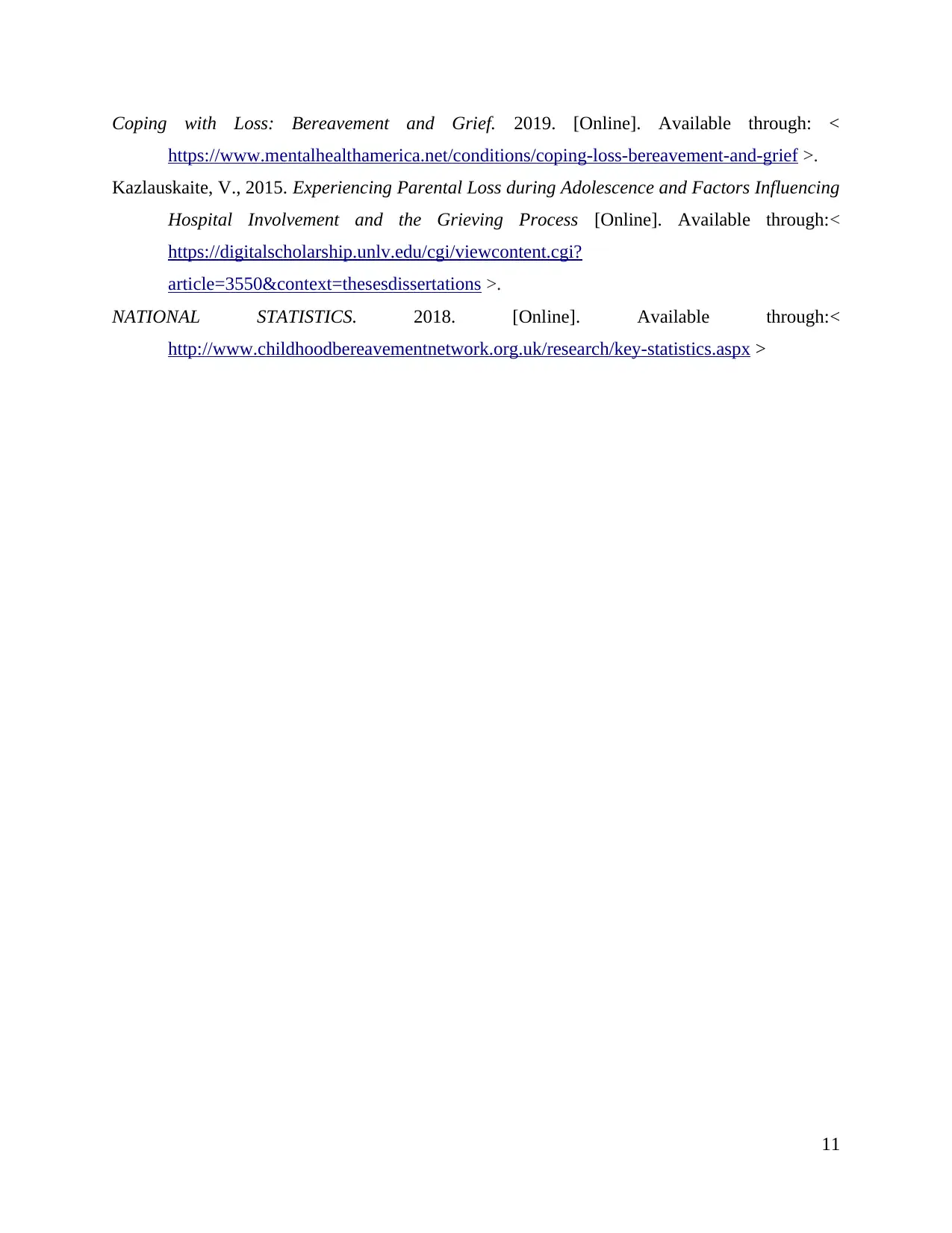
Coping with Loss: Bereavement and Grief. 2019. [Online]. Available through: <
https://www.mentalhealthamerica.net/conditions/coping-loss-bereavement-and-grief >.
Kazlauskaite, V., 2015. Experiencing Parental Loss during Adolescence and Factors Influencing
Hospital Involvement and the Grieving Process [Online]. Available through:<
https://digitalscholarship.unlv.edu/cgi/viewcontent.cgi?
article=3550&context=thesesdissertations >.
NATIONAL STATISTICS. 2018. [Online]. Available through:<
http://www.childhoodbereavementnetwork.org.uk/research/key-statistics.aspx >
11
https://www.mentalhealthamerica.net/conditions/coping-loss-bereavement-and-grief >.
Kazlauskaite, V., 2015. Experiencing Parental Loss during Adolescence and Factors Influencing
Hospital Involvement and the Grieving Process [Online]. Available through:<
https://digitalscholarship.unlv.edu/cgi/viewcontent.cgi?
article=3550&context=thesesdissertations >.
NATIONAL STATISTICS. 2018. [Online]. Available through:<
http://www.childhoodbereavementnetwork.org.uk/research/key-statistics.aspx >
11

12
⊘ This is a preview!⊘
Do you want full access?
Subscribe today to unlock all pages.

Trusted by 1+ million students worldwide
1 out of 15
Related Documents
Your All-in-One AI-Powered Toolkit for Academic Success.
+13062052269
info@desklib.com
Available 24*7 on WhatsApp / Email
![[object Object]](/_next/static/media/star-bottom.7253800d.svg)
Unlock your academic potential
Copyright © 2020–2026 A2Z Services. All Rights Reserved. Developed and managed by ZUCOL.





